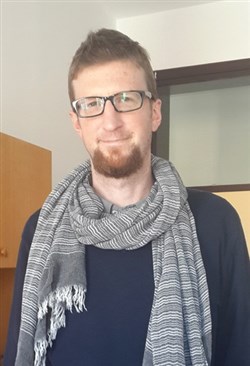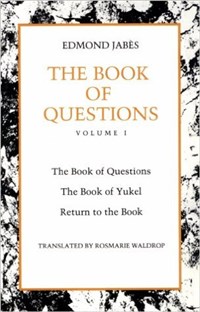Andrew Jonathan Ploeg, Assistant Professor, Program in Cultures, Civilizations and Ideas
BY MELİS ERDEM (ARCH/III)
 The book that most influenced me is “The Book of Questions” by Edmond Jabès. Using it for my answer is sort of cheating, I guess, as it actually consists of multiple volumes. But, I was introduced to it while I was writing my master’s thesis in English, and it helped me both to understand and to articulate ideas that I was working on at the time and so helped me pull together my thesis. But it was also a personal revelation for me. Although the book was written by a French-Egyptian author and in that sense was far from my own experiences, Jabès and I shared certain perspectives on language, on truth, on divinity and on the interrelation of the three. “The Book of Questions” also struck me with the beauty of its language; in fact, it is commonly considered a work of poetry. For myself, I think it’s really difficult to define in terms of its genre, whether it’s poetry, whether it’s a novel, or whether it’s some other sort of theoretical or Jewish mystical text; it is, in some ways, all those things at once.
The book that most influenced me is “The Book of Questions” by Edmond Jabès. Using it for my answer is sort of cheating, I guess, as it actually consists of multiple volumes. But, I was introduced to it while I was writing my master’s thesis in English, and it helped me both to understand and to articulate ideas that I was working on at the time and so helped me pull together my thesis. But it was also a personal revelation for me. Although the book was written by a French-Egyptian author and in that sense was far from my own experiences, Jabès and I shared certain perspectives on language, on truth, on divinity and on the interrelation of the three. “The Book of Questions” also struck me with the beauty of its language; in fact, it is commonly considered a work of poetry. For myself, I think it’s really difficult to define in terms of its genre, whether it’s poetry, whether it’s a novel, or whether it’s some other sort of theoretical or Jewish mystical text; it is, in some ways, all those things at once.
There are many voices in the book, though few actual characters, if they can in fact be called that. The text’s two main voices are those of Yukel and his love interest, Sarah, Jews who are separated and taken to concentration camps during World War II. They are never reunited again; she goes insane and he dies. However, they speak to each other from beyond the grave; even after Yukel’s physical death he continues to have a voice in the text. So, these are rather interesting characters, presented in an unconventional way.
“The Book of Questions” is full of quotes that I love, particularly those from the fictional rabbis who comment on the text itself in aphoristic statements that mimic the Midrashic tradition. One of my favorites is: “Sometimes I ask what would happen if distance were suddenly abolished. We would quickly lose our hearing. And if the sky and the dark disappeared? The stars, soldered to one another, would form a ceiling of fire. The sun would by itself be the day. We would burn to death.” In this quote, he uses the black and white of the night sky as a metaphor for the black and white of a book’s page, emphasizing the importance of distance, or absence, in language and in our relationship to divinity. Every page of Jabès’s text reflects this philosophy, as he uses extensive white space as protection against this metaphorical “ceiling of fire.”
In a very practical sense, if I hadn’t read the book, it would have been difficult for me to finish my master’s thesis, as, before I read the text, I was writing a literary thesis with no actual literature in it. But beyond that, it has continued to strongly influence my thought. One of the things I appreciate most about the book is its seamless integration of theory and practice. The two are inseparable for Jabès; I find that this is not always the case in other works. People often think of theory as esoteric and obscure, as something that does not really affect one’s writing or one’s life in any significant way. Yet, the integration of the two is something that I have tried to achieve in my own scholarship and life.
But beyond that, it has continued to strongly influence my thought. One of the things I appreciate most about the book is its seamless integration of theory and practice. The two are inseparable for Jabès; I find that this is not always the case in other works. People often think of theory as esoteric and obscure, as something that does not really affect one’s writing or one’s life in any significant way. Yet, the integration of the two is something that I have tried to achieve in my own scholarship and life.
Jabès is deeply invested in questions; this is clear from the book’s title. For him, the question’s significance comes from its tenacity, its refusal to be answered simply or definitively. His interest in writing the book was not in answering questions, but rather in posing them, which is another aspect of this work that I especially appreciate.
In short, the first three volumes of “The Book of Questions” are something that I very much enjoy. I think that anything Jabès has written is well worth reading. My only slight hesitation in recommending it would be that one should not have a particular kind of expectation when reading it. For instance, if you’ve been told that it’s a book of poetry, you’ll read it with that expectation in mind. But if you can approach the book with an open mind, not expecting it to fit neatly into any particular genre, I would highly recommend it.
